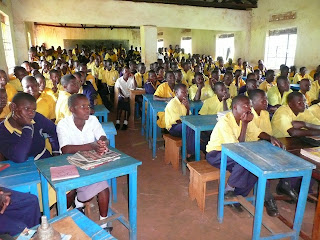Hello friends and supporters of Communities of Shalom and World Hope Corps:
My name is Gaius Charles and I am a Master of Divinity student at Drew University where I have had the privilege of studying and working with Dr. Michael Christensen. Recently I had the opportunity to participate in Dr. Christensen’s Shalom Zone Training in Uganda to support the interfaith work of Drew University’s Communities of Shalom Ministry in Jinja, Sesse and Mbale, in Eastern Uganda.
The trip was extraordinary and it opened my eyes to the challenging realities that many Ugandans face every day. For example, at one school we visited, several kids were infected with HIV. At another school, the students listened attentively as we shared with them about AIDS prevention and also how God calls us into certain vocations and ministries. They were delighted when we presented them with a simple soccer ball.
Since returning to the US after a week in Uganda, I've been asking "what can I do to help?"
As part of the ongoing work of Shalom (a ministry dedicated to bringing healing, wholeness and prosperity to spiritually, social and economically disadvantaged communities all around the world) our host, Pastor Baamu Moses, is launching a youth conference next month centered around a soccer competition to teach young people about AIDS and HIV awareness.
I’m sure many of you already know how much AIDS and HIV have devastated the continent of Africa, taking the lives of generations of its people, and Uganda is no exception. This youth conference will serve as a great opportunity to empower the youth and shine a beacon of light, hope and inspiration as it educates young people and helps them transcend the challenges of this devastating epidemic.
The HIV/AIDS project of the Uganda Shalom Zone is a worthy cause, and I’d like to invite you to partner with me, Dr. Christensen, and Pastor Moses to make this ministry a success.
Here’s how we can help: Pastor Baamu Moses has asked for assistance with his youth conference. A financial goal of $500 has been set to help purchase soccer balls, food, transportation and other resources for the event. While this may seem a modest amount, $500 will surely go a long way in supplying the need for this ministry.
Any contribution you are able to make—whether it be 5, 10, or 20 dollars or more-- would be greatly appreciated. Please think it over, pray about it and consider making a donation today. I know that the $500 goal can be met and that lives will be changed because of your love, generosity and faithfulness.
All donations are tax deductible and can be made in the form of check or money order. Please make all contributions payable to "Drew University" with a memo titled "Uganda Shalom Fund."
Checks can be mailed directly to:
Communities of Shalom Resource Center
Drew University Theological School
36 Madison Avenue
Madison, NJ 07940
Click for online giving: http://www.drew.edu/alumni/giving-to-drew
Click for online giving: http://www.drew.edu/alumni/giving-to-drew
Also because the event is just around the corner we ask that you make your donation no later than July 15, 2011. Thank you and God bless, Gaius
P.S. If you have any questions about this effort, please feel free to email me at gaiuscharles@gmail.com
 |
| Gaius Charles at Secondary School in Sesse |
And check out Shalom's website at: http://www.communitiesofshalom.org/ Thanks again!
Dr. Michael Christensen at Good Shepherd School




